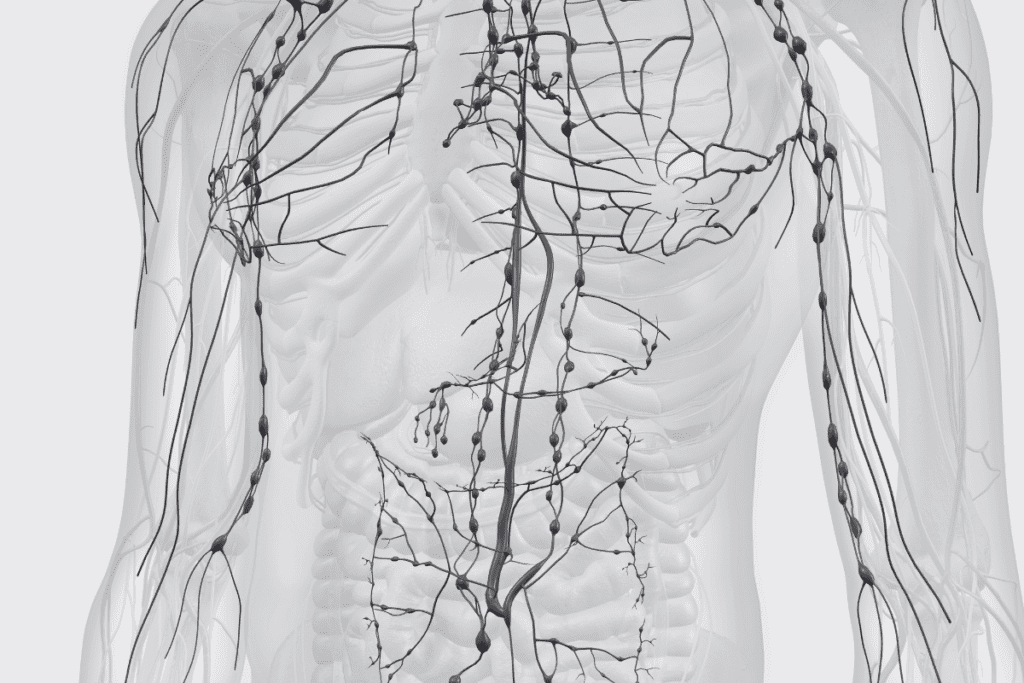Lymph Revealed: A Wellness Secret
August 12, 2023

Lymph Revealed: A Wellness Secret. Discovering information about the lymphatic system during my quest for solutions to chronic health issues served as a profound awakening. The significance of my lymphatic health swiftly emerged as a primary driving force in my personal journey.
The lymphatic system stands as your body’s unspoken defender of well-being, functioning as a filtration system and having a substantial influence over immunity. What captured my focus most was the revelation that exercise elevates lymph flow efficiency by a factor of ten. As an individual grappling with chronic health conditions, the recommended amount of physical activity was not an option. This raised many questions for me: Was my lymph stagnant from my inactivity and contributing to my chronic conditions? If exercise isn’t an option, what other options do I have?
While illness can have many root causes, lymphatic health can play a huge role as an underlying contributer, making it crucial for us as beings to take care of our lymph, especially if we are inactive.
Navigating the Body’s Pathways:
We have two circulatory systems: the cardiovascular system and the the lymphatic system
The cardiovascular system comprises two essential components: your heart and your network of blood vessels. Operating as a pump, your heart propels blood throughout your body, while the blood vessels facilitate the conveyance of oxygen and nutrients to the cells. This system forms a seamless cycle that expels carbon dioxide and provides crucial nutrients, enabling our physical movement and maintaining optimal body temperature.
Your lymphatic system is twice as vast as the cardiovascular system but has NO pump.
The lymphatic system holds immense significance in terms of digestion, immunity, and overall well-being. It functions as a sanitation and recycling mechanism for the body, effectively eliminating waste. However, unlike the cardiovascular system, the lymphatic system lacks a central pump to propel its lymph fluid throughout the body.
The lymph system relies on the pulsing of arteries, skeletal muscle contractions, and breathing to propel it’s fluid toward the heart.
Its Roles:
- An integral component of your immune system, it generates white blood cells with the power to neutralize harmful pathogens.
- Acting as a meticulous garbage collector, it filters out bacteria and toxins that can potentially induce diseases.
- In the realm of digestion, it aids by absorbing fats and fatty acids from the digestive tract, transporting them into the bloodstream for cellular energy.
- Maintaining fluid balance, it collects, purifies, and expels excess fluids to prevent tissue swelling.
Lymphatic Congestion:
People often overlook poor lymph flow as a potential cause to their chronic symptoms. When the lymph load is exposed to excess debris, it can lead to lymph congestion. Hindered lymph flow can arise from many factors and can especially happen with the compounded physical and emotional stress we experience in this modern world. Lymph congestion can manifest as a variety of chronic symptoms including bloating, inflammation, discomfort, digestive problems, fatigue, and eczema. Find the full list of ailments that can be due to lymph congestion in The Book of Lymph.
The great news is we have the power to improve our lymph flow.
Lymphatic Health and Belly Breathing:
Your diaphragm, a thin muscle beneath your lungs, constantly moves to sustain lung function. Deep breathing shifts diaphragm contractions, altering chest pressure and helping lymph move from the lower body to the heart through the thoracic duct. Ensuring there is optimal lymph flow from your lower body to the upper body is vital to well-being. Deep breathing is clearly not only a form of meditation that boosts the parasympathetic nervous system, but also plays a crucial role in lymph flow and immunity. Learn how to optimally belly breath in our blog Why “Belly” Breathing is Wrong.
Taking Care of your lymph :
Lymphatic Drainage through Massage:
Enhance lymphatic flow using manual lymph drainage, performed either by yourself or a professional. This gentle massage technique is designed to guide interstitial lymph fluid toward lymph nodes. Book Lymphatic Drainage Massage with me here.
Caring for Your Skin and Body:
- Reflexology: Reflexology is believed to stimulate lymphatic flow through specific pressure points on the feet, which can help enhance the circulation of lymph throughout the body. By targeting these reflex points, reflexologists aim to encourage lymphatic drainage and support the body’s natural detoxification processes. Book Foot Reflexology with me here.
- Dry Brushing: Revitalize your skin by gently removing dead cells, improving skin tone, and stimulating cell renewal. This invigorating technique also energizes your nervous system, boosts immune function, and promotes lymph flow.
- Skin Absorption: Remember that 60% of what you apply to your skin is absorbed into the lymphatic system. Opt for safe and clean skin care and cleaning products to ensure your well-being.
- Epsom Salts Bath: Enjoy an Epsom salts bath to reduce inflammation and boost circulation and digestion. These salts contain sulfates and magnesium that assist in flushing out toxins and heavy metals through reverse osmosis. Bathing promotes the parasympathetic nervous system, counteracting the effects of stress (Caution for people who have diabetes or lymphedema).
- Exercise: Muscular movement is key to lymphatic fluid circulation and can improve your lymph flow by ten fold. As you move, muscle contractions generate a natural systemic lymphatic response. The more you exercise, the more effective the response.
Lymph:The Overlooked Elixir of Health and its silent yet essential role. Let’s embrace the wisdom of this unsung hero and celebrate its influence on our holistic wellness by showing some love to our lymph.
Resources: The Book of Lymph
home
about
book massage
©2023 lucid healing | all rights reserved | site credit karima creative | TERMS OF SERVICE | PRIVACY POLICY | Disclaimer